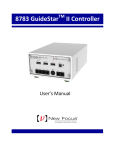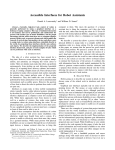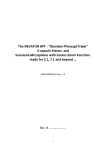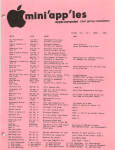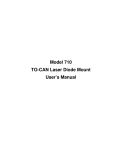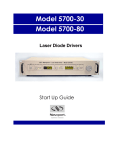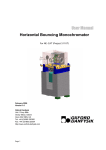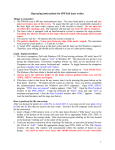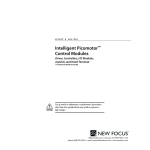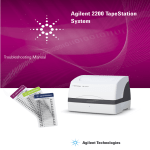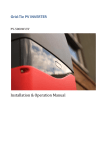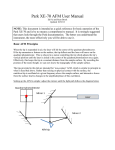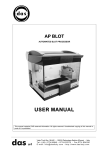Download A-1 - Newport Corporation
Transcript
8783 GuideStar II
Model 8783 GuideStar II Controller
User’s Manual
EU Declaration of Conformity
We declare that the accompanying product, identified with the
Electromagnetic Compatibility Directive,
2004/108/EC and the Low Voltage Directive 2006/95/EC.
mark, complies with requirements of the
Model Numbers: 8783
mark affixed: 2012
Type of Equipment: Electrical equipment for measurement, control and laboratory use in industrial locations.
Manufacturer:
Newport Corporation
1791 Deere Avenue
Irvine, CA 92606
Standards Applied:
Compliance was demonstrated to the following standards to the extent applicable:
BS EN61326-1: 2006 “Electrical equipment for measurement, control and laboratory use – EMC
requirements” for use in a controlled electromagnetic environment.
This equipment meets the CISPR 11:2009+A1 Class A Group 1 radiated and conducted emission limits.
nd
BS EN 61010-1:2001, 2 Edition “Safety requirements for electrical equipment for measurement, control
and laboratory use”.
Dominique Devidal Quality Director Zone Industrielle
45340 Beaune-la-Rolande, France
Warranty
New Focus warrants that this product will be free from defects in material and workmanship and will comply
with Newport’s published specifications
at the time of sale for a period of one year from date of shipment. If found to be defective during the warranty
period, the product will either be repaired or replaced at Newport's option.
To exercise this warranty, write or call your local Newport office or representative, or contact Newport
headquarters in Irvine, California. You will be given prompt assistance and return instructions. Send the product,
freight prepaid, to the indicated service facility. Repairs will be made and the instrument returned freight
prepaid. Repaired products are warranted for the remainder of the original warranty period or 90 days,
whichever first occurs.
Limitation of Warranty
The above warranties do not apply to products which have been repaired or modified without Newport’s written
approval, or products subjected to unusual physical, thermal or electrical stress, improper installation, misuse,
abuse, accident or negligence in use, storage, transportation or handling. This warranty also does not apply to
fuses, batteries, or damage from battery leakage.
THIS WARRANTY IS IN LIEU OF ALL OTHER WARRANTIES, EXPRESSED OR IMPLIED, INCLUDING ANY IMPLIED
WARRANTY OF MERCHANTABILITY OR FITNESS FOR A PARTICULAR USE.
NEW FOCUS SHALL NOT BE LIABLE FOR ANY INDIRECT, SPECIAL, OR CONSEQUENTIAL DAMAGES RESULTING
FROM THE PURCHASE OR USE OF ITS PRODUCTS.
First printing 2012
© 2012 by New Focus, Santa Clara, CA. All rights reserved. No part of this manual may be reproduced or copied
without the prior written approval of New Focus.
This manual has been provided for information only and product specifications are subject to change without
notice. Any change will be reflected in future printings.
New Focus
3635 Peterson Way
Santa Clara, CA, 95054
USA
Part No. 90038357 Rev A
Confidentiality & Proprietary Rights
Reservation of Title
The New Focus programs and all materials furnished or produced in connection with them ("Related Materials")
contain trade secrets of New Focus and are for use only in the manner expressly permitted. New Focus claims
and reserves all rights and benefits afforded under law in the Programs provided by New Focus.
New Focus shall retain full ownership of Intellectual Property Rights in and to all development, process, align or
assembly technologies developed and other derivative work that may be developed by New Focus. Customer
shall not challenge, or cause any third party to challenge the rights of New Focus.
Preservation of Secrecy and Confidentiality and Restrictions to Access
Customer shall protect the New Focus Programs and Related Materials as trade secrets of New Focus, and shall
devote its best efforts to ensure that all its personnel protect the New Focus Programs as trade secrets of New
Focus. Customer shall not at any time disclose New Focus's trade secrets to any other person, firm, organization,
or employee that does not need (consistent with Customer's right of use hereunder) to obtain access to the New
Focus Programs and Related Materials. These restrictions shall not apply to information (1) generally known to
the public or obtainable from public sources; (2) readily apparent from the keyboard operations, visual display, or
output reports of the Programs; 3) previously in the possession of Customer or subsequently developed or
acquired without reliance on the New Focus Programs; or (4) approved by New Focus for release without
restriction.
Trademarks
The New Focus logo and name are registered trademarks of Newport Corporation in Mexico, Israel, Singapore,
European Union, Taiwan, Hong Kong, China, Japan, Korea, Canada, Australia, and the United States.
Service Information
This section contains information regarding factory service for the source. The user should not attempt any
maintenance or service of the system or optional equipment beyond the procedures outlined in this manual. Any
problem that cannot be resolved should be referred to New Focus.
Technical Support Contacts
North America
Europe
New Focus
3635 Peterson Way, Santa Clara, CA 95054
Telephone: (866) 683-6287
Telephone: (408) 919-1500
Newport/MICRO-CONTROLE S.A.
Zone Industrielle
45340 Beaune la Rolande, FRANCE
Telephone: (33) 02 38 40 51 56
Asia
Newport Opto-Electronics Technologies 中国 上海市 爱都路 253号 第3号楼 3层 C部位, 邮编
200131
253 Aidu Road, Bld #3, Flr 3, Sec C, Shanghai 200131, China
Telephone: +86-21-5046 2300
Fax: +86-21-5046 2323
Newport Corporation Calling Procedure
If there are any defects in material or workmanship or a failure to meet
specifications, promptly notify Newport's Returns Department by calling 1-800-2226440 or by visiting our website at www.newport.com/returns within the warranty period to obtain a Return
Material Authorization Number (RMA#). Return the product to Newport Corporation, freight prepaid, clearly
marked with the RMA# and we will either repair or replace it at our discretion. Newport is not responsible for
damage occurring in transit and is not obligated to accept products returned without an RMA#.
E-mail: [email protected]
When calling Newport Corporation, please provide the customer care representative with the following
information:
Your Contact Information
Serial number or original order number
Description of problem (i.e., hardware or software)
To help our Technical Support Representatives diagnose your problem, please note the following
conditions:
Is the system used for manufacturing or research and development?
What was the state of the system right before the problem?
Have you seen this problem before? If so, how often?
Can the system continue to operate with this problem? Or is the system non- operational?
Can you identify anything that was different before this problem occurred?
Table of Contents
1
Introduction .............................................. 3
1.1
2
Safety Precautions .................................. 4
2.1
2.2
3
Definitions and Symbols ....................................................4
2.1.1 General Warning or Caution..................................4
2.1.2 Electric Shock ........................................................4
2.1.3 European Union CE Mark .....................................5
2.1.4 Alternating Voltage Symbol ..................................5
2.1.5 USB .......................................................................5
2.1.6 Frame or Chassis ...................................................5
2.1.7 Waste Electrical and Electronic Equipment
(WEEE) .............................................................................6
2.1.8 Control of Hazardous Substances ..........................6
Warnings and Cautions ......................................................7
2.2.1 General Warnings ..................................................7
2.2.2 General Cautions ...................................................7
2.2.3 Summary of Warnings and Cautions .....................8
2.2.4 Additional power supply warnings ........................8
Getting Started ......................................... 9
3.1
3.2
3.3
3.4
3.5
3.6
4
Summary of GuideStar II System......................................3
Unpacking and Handling ...................................................9
Inspection for Damage .......................................................9
Parts List ............................................................................9
Choosing and Preparing a Suitable Work Surface .............9
Electrical Requirements ...................................................10
Computer requirements ...................................................10
System Operation .................................. 11
4.1
4.2
4.3
System Overview.............................................................11
System set up ...................................................................11
Hardware set up ...............................................................12
4.3.1 Beam Pick-offs and Optical Power .....................12
1
4.4
5
4.3.2 Optical Layout .....................................................12
Software Operation ..........................................................14
4.4.1 System Set-up ......................................................14
4.4.2 Guide Star II Tab .................................................15
4.4.3 Beam Profiler Tab ...............................................18
4.4.4 Pointing Stability Tab ..........................................19
4.4.5 Stability Analysis .................................................19
4.4.6 Changing Scales on Images and Charts ...............20
4.4.7 Exiting the GuideStar II Application ...................20
Principles of Operation ......................... 21
5.1
5.2
GuideStar II Algorithm Theory .......................................21
Acquiring the Motion Matrix ..........................................22
6
Frequently Asked Questions ................ 23
7
Maintenance and Service ...................... 26
7.1
7.2
7.3
Warranty ..........................................................................26
Technical Support ............................................................26
Obtaining Service ............................................................26
2
1 Introduction
1.1
Summary of GuideStar II System
The GuideStar™ II laser stabilization system guarantees critical alignment of complex laser systems by
compensating beam pointing and position drift. The system is based on Picomotor™ actuated mirrors which
provide high-precision control with outstanding intrinsic stability. Two miniature cameras provide complete
position, pointing, and profile information, while dedicated software implements a user-friendly, intelligent
control algorithm that keeps the beam’s four degrees of freedom precisely locked. The position data is fed
back to the mirror using our patented control algorithm (US Patent # 7,528,364 Optical Beam Steering and
Sampling Apparatus and Method, 2009), the only technique that completely corrects the laser beam
position in both X and Y and the beam rotation about both X and Y.
The system is anchored by the small GuideStar II Model 8783 controller which serves as a USB hub for
communication with the cameras and also serves as a multiplexed Picomotor driver to generate drive
signals for the four motors.
The controller connects to the user’s host computer via USB. And the host computer runs the GuideStar II
software which is full of user-friendly and convenient features such as full beam profiles, beam position data
which can be tracked, stored, and analyzed. An easy set-up menu guides new users through the installation.
Simple settings menus allow complete control of a wide range of camera and beam stabilization parameters
including: 1000:1 dynamic camera exposure time, loop gain to optimize performance of the control loop,
and complete control of target size and location for each camera.
Designed for accuracy, reliability, and ease-of-use, the GuideStar™ II System is the answer to laser beam drift
correction for the most demanding laser applications.
3
2 Safety Precautions
2.1
Definitions and Symbols
The following terms and symbols are used in this documentation and appear on the Model 8783
Guidestar II controller where safety-related issues occur.
2.1.1 General Warning or Caution
Figure 1. General Warning or Caution Symbol
The Exclamation Symbol in the figure above appears on the product and in Warning and Caution
tables throughout this document. This symbol designates that documentation needs to be
consulted to determine the nature of a potential hazard, and any actions that have to be taken.
2.1.2 Electric Shock
Figure 2. Electrical Shock Symbol
The Electrical Shock Symbol in the figure above appears throughout this manual. This symbol
indicates a hazard arising from dangerous voltage. Any mishandling could result in irreparable
damage to the equipment, and personal injury or death.
4
2.1.3 European Union CE Mark
Figure 3. CE Mark
The presence of the CE Mark on Newport Corporation equipment means that this instrument has
been designed, tested and certified compliant to all applicable European Union (CE) regulations
and recommendations.
2.1.4 Alternating Voltage Symbol
Figure 4. Alternating Voltage Symbol
This international symbol implies an alternating voltage or current.
2.1.5 USB
Figure 5. USB Symbol
The symbol in the figure above identifies the USB connector location on the Model 8783
Controller.
2.1.6 Frame or Chassis
Figure 6. Frame or Chassis Terminal Symbol
The symbol in the figure above appears on the Model 8783 Controller. This symbol identifies the
frame or chassis terminal.
5
2.1.7 Waste Electrical and Electronic Equipment (WEEE)
Figure 7. WEEE Directive Symbol
This symbol on the product or on its packaging indicates that this product must not be disposed
with regular waste. Instead, it is the user responsibility to dispose of waste equipment according
to the local laws. The separate collection and recycling of the waste equipment at the time of
disposal will help to conserve natural resources and ensure that it is recycled in a manner that
protects human health and the environment. For information about where the user can drop off
the waste equipment for recycling, please contact your local Newport Corporation
representative.
2.1.8 Control of Hazardous Substances
Figure 8. RoHS Compliant Symbol
This label indicates the products comply with the EU Directive 2002/95/EC that restricts the
content of six hazardous chemicals.
6
2.2
Warnings and Cautions
2.2.1 General Warnings
Observe these general warnings when operating or servicing this equipment:
Heed all warnings on the unit and in the operating instructions.
Do not use this equipment in or near water.
This equipment is grounded through the grounding conductor of the power cord.
Route power cords and other cables so that they are not likely to be damaged.
Disconnect power before cleaning the equipment. Do not use liquid or aerosol cleaners;
use only a damp lint-free cloth.
Lockout all electrical power sources before servicing the equipment.
To avoid fire hazard, use only the specified fuse(s) with the correct type number, voltage
and current ratings as referenced in the appropriate locations in the service instructions
or on the equipment. Only qualified service personnel should replace fuses.
To avoid explosion, do not operate this equipment in an explosive atmosphere.
Qualified service personnel should perform safety checks after any service.
2.2.2 General Cautions
Observe these cautions when operating this equipment:
If this equipment is used in a manner not specified in this manual, the protection
provided by this equipment may be impaired.
Do not block ventilation openings.
Do not position this product in such a manner that would make it difficult to disconnect
the power cord.
Use only the specified replacement parts.
Follow precautions for static sensitive devices when handling this equipment.
This product should only be powered as described in the manual.
There are no user-serviceable parts inside the Model 8783 GuideStar II controller.
Adhere to good laser safety practices when using this equipment.
7
2.2.3 Summary of Warnings and Cautions
The following are definitions of the Warnings, Cautions and Notes that are used throughout this manual to call
your attention to important information regarding your safety, the safety and preservation of your equipment, or
an important tip.The following general warning and cautions are applicable to this instrument:
2.2.4 Additional power supply warnings
This product is equipped with a three prong plug. For proper operation and your protection this plug should not
be modified and must be plugged directly into a properly grounded three prong receptacle.
This product if not provided with a power switch. Do not block access to the power connector in case emergency
shutdown is required.
Voltages of up to 130V are accessible inside the driver chassis, mounts, and Picomotors. Although protection
circuits are included, do not operate the units with the driver or mount covers removed. If the wire of a mount
of Picomotor is frayed, discontinue use and return item for repair.
8
3 Getting Started
3.1
Unpacking and Handling
It is recommended that the Model 8783 GuideStar II controller be unpacked carefully in a lab environment; small
parts are included with the instrument. Inspect the box carefully for loose parts. You are advised to save the
packaging material in case you need to ship your equipment in the future.
3.2
Inspection for Damage
The Model 8783 GuideStar II controller is carefully packaged at the factory to minimize the possibility of damage
during shipping. Inspect the box for external signs of damage or mishandling. Inspect the contents for damage.
If there is visible damage to the instrument upon receipt, inform the shipping company and New Focus
immediately. Carefully open the box and save the shipping material for later use.
3.3
Parts List
The following is a list of parts included with the Model 8783 GuideStar II controller:
3.4
8783 GuideStar II controller
CD with Software Drivers and Utilities, User’s Manual, Start Up Guide.
Power adaptor and power cord.
USB cable for connecting to computer. If you are missing any parts or have questions about the parts you
have received, please contact New Focus.
Choosing and Preparing a Suitable Work Surface
The GuideStar II may be placed on any reasonably firm table or bench during operation.
9
3.5
Electrical Requirements
Before attempting to power up the unit for the first time, the following precautions must be followed:
3.6
Have a qualified electrician verify the wall socket that will be used is properly polarized and properly
grounded.
Provide adequate distance between the Models 8783 GuideStar II Controller and adjacent walls for
ventilation purposes. Do not let any other equipment blow hot air towards the unit.
Computer requirements
Software:
Windows 7 – 32 bit, 64 bit
Windows XP – 32 bit only
Processor:
AMD DUAL CORE, AMD QUAD CORE
Intel Pentium Dual Core, Intel Pentium Quad Core, Intel Pentium Core ( i3 , i5 , i7 )
RAM 4GB minimum
HDD 160GB minimum
DVD player
Screen resolution: 1920x1080 minimum
Monitor: HD 1920x1080 resolution minimum
10
4 System Operation
4.1
System Overview
GuideStar II is a closed-loop beam stabilization system in which cameras measure beam position at two points
along the beam path, while two preceding mirrors actuated by Picomotors keep these two positions steady. The
centroid information from each camera is processed and fed back to the X and Y control of each mirror mount in
a generalized manner via a 16-element array (called the “Motion Matrix”). This approach accounts for all directand cross- couplings between the centroid position and the mirror axes, allowing for nominally perfect control
of the beam with arbitrary optical systems. An automated calibration routine provides the needed stimulus to
each motor to determine the Motion Matrix values.
The control loop functions by making adjustments to the mirrors only when the beam has drifted out of a userdefined target area on one or both of the camera sensors. When this happens, the beam is moved back inside
the target area on both sensors. To provide control over how often the beam is moved, an Inner Target and an
Outer Target are defined for the sensors. When the beam drifts outside of one or both of the Outer Targets, it is
moved back inside the smaller Inner Target on both sensors. Then it is not moved again until it drifts outside of
one or both of the Outer Targets. Suitable choice of the target sizes can result in relatively infrequent motor
activity to maintain beam pointing and position within a user-defined range. Thus the beam can be left largely
unperturbed.
Dynamic performance of the control loop is determined by several things. Two settings in particular allow one to
control the dynamic behavior – the Loop Gain and Frames to Average Over. These provide the flexibility to
optimize the loop response.
The Model 8784 cameras are shipped with an installed lens and neutral density filters. The lens provides beam
size reduction, allowing ~1-cm beams to be used with the 5.3 mm sensors. The cameras’ OD-1,-2, and -4 filters
provide coarse optical attenuation, while the exposure time setting of the cameras allows for fine exposure
control over a range of roughly 1 – 1000 ms.
In addition, operation with low (<500 Hz) repetition rate lasers is possible with the Model 8783-T Trigger Kit.
4.2
System set up
The Quick Start Guide contains information to set up the system. Please refer to the quick start guide to install
software, configure the cameras, and connect components with the included cables. Additional details on
hardware set up and software operation are found below.
11
4.3
Hardware set up
4.3.1 Beam Pick-offs and Optical Power
The power required for the cameras is low, so it is recommend that the leakage through HR mirrors with
polished backsides be used as beam “pickoffs.” Other options include reflections off AR surfaces or uncoated
beam-splitters in the beam. The saturation power of the cameras is shown in Figure 3.2a. If beam size and
exposure time are accounted for, this figure can be used to choose appropriate pick-offs and attenuation for the
beam. Fine tuning of power is accomplished via the exposure time so as to maximize dynamic range.
1W
1 mW
1mW
1 nW
300
400
500
600
700
800
900
1000 1100 1200 1300
Wavelength (nm)
Figure 9. Approximate saturation power of the cameras with a 10-ms exposure time and a 2-mm beam
diameter. Exposure time can range from 1 to 980 ms.
4.3.2 Optical Layout
The physical layout of the two cameras and two motorized mirror mounts may affect the performance of the
GuideStar II System. As a general guideline, the separation between the mirrors and the separation between the
cameras should be large and comparable, while the separation between Mirror 2 and Camera 1 should be much
shorter, as short as conveniently possible (see Figure 3.2b). Typical values might be 50 cm between mirrors, 50
cm between cameras, and 10 cm between Mirror 2 and Camera 1.
Note that the system can tolerate a wide range of deviation from these guidelines. In general, however, a larger
spacing between cameras will allow for tighter pointing control, since the maximum pointing drift under closedloop operation will be determined by the ratio of the Target size to the separation between the cameras. For
example, for a 30m separation.
12
MIRROR MOUNT 1
LASER
BEAM IN
MIRROR
MOUNT 2
CAMERA 1
LASER
BEAM OUT
CAMERA 2
Figure 10. Example physical layout of mirrors and cameras for GuideStar II system.
To optimize performance, Camera 2 can be positioned so as to image a plane equivalent to the users working
plane. This can be accomplished by setting the distance between the second pickoff and the working plane
comparable to the distance between the second pickoff and Camera 2’s object plane, which is about 4 cm in
front of the lens. By doing this the beam position data and image shown by the GuideStar II software are
essentially those of the working plane.
13
4.4
Software Operation
4.4.1 System Set-up
The first time the application is launched it will automatically open the System Set-up window and display the
Camera Check tab:
This window cannot be closed until steps 1 - 4 are completed. If blocking the beams to the cameras causes the
wrong image to disappear in the GuideStar II display, then swap the camera IDs. (See FAQ section)
Now, click “Next” or click on the “GuideStar II Auto Configuration” tab:
14
Set the target position by clicking the Set Target Position button. This will ensure that the system will return to
the original alignment after the motion acquisition. The target position can easily be re-set later if additional
adjustment is desired. This is done by re-clicking the Set Target Position button.
Next click the “Acquire Motion Matrix” button. Over the next several minutes, the system will move each motor
(X1, Y1, X2, Y2) by pre-defined amounts in the positive and negative directions. It will stop once it has gathered
enough information or the beam has moved to the edge of the optical aperture. Once the motion matrix
acquisition is finished the green light next to the Acquire Motion Matrix button will be lit.
Finally, click the “Acquire Target Size” button and the software will analyze the noise of the beam to determine a
recommended target size for the motion settings. (The recommended target size can be changed later if
desired.) Click the Finished button to close the System Set-up window and save the settings via the pop-up
window.
4.4.2 Guide Star II Tab
The first tab of the GuideStar II program is labeled Guide Star II. On this tab is each camera’s image; a display of
the target and centroid locations for each camera; buttons for System Set-up, Camera Settings, and Motion
Settings; indicator lights and a Lock On/Off button; and two controls for manually activating the motors:
This button will turn off Lock and open the same System Set-up window described above which is launched
when the program is first run. System set-up can be repeated at any time. To close the window, click on the
15
Finished button on the GuideStar II Auto Configuration tab. A pop-up window will open in which you can save
changes to the System Set-up.
This button will turn off Lock and open the Camera Settings window:
o
o
o
o
o
Exposure Times should be set so that Max Value for each camera is somewhat less than 255. The
sensors saturate at Max Value = 255.
Pixel Clock If this is set too high a “pixel clock error” may occur. The default value can be used in most
cases.
FPS (frames per second) A lower FPS will slow loop response but will permit longer Exposure Times. The
default value can be used in most cases.
Telescope magnification The default value should be used in most cases. This number is used to convert
positions on the camera sensors to positions of the incident beam. Values of beam position and width
reported on all tabs scale with this number. The default is the nominal value at the center of the image.
Distortion is present towards the image edges.
Threshold Pixel values below the Threshold will be ignored in centroid calculations. This is used to
reduce effects of ambient or stray light.
To close the Camera Settings window, click on the OK button.
16
This button will turn off Lock and open the Motion Settings window:
o
o
o
o
o
o
o
Set Target Position This button will reset the target centers to the current beam locations. This can be
executed without the need to re-acquire the Motion Matrix.
Target Width is the size of the Outer Target.
Inner Target Fraction Target Width multiplied by the Inner Target Fraction gives the Inner Target size.
Loop Gain When position Lock is on, and the beam moves outside the outer target, the motors are
commanded to move the beam back to the Inner Target. The distance to the center of the Inner Target,
scaled by the Loop Gain, is the size of the step taken. This parameter will influence the dynamic
response of the control loop. It is recommended that one start with the default value and adjust it to
achieve a well-behaved (no ringing, relatively fast) return of the beam to the Inner Target. A higher value
will increase speed of loop response but may lead to ringing or erratic behavior. A lower value will give a
well-behaved response but may make the response to slow. Typically, Loop Gain is set such that the
beams are brought back to their Inner Targets within 2-5 seconds.
Inner Gain Fraction This value will scale the loop gain once the beam is within the Outer Target.
Frames to Average Over Determines the level of running averaging for centroid locations used in the
control algorithm. As with Loop Gain, it is recommended that one start with the default value and adjust
it to achieve a well-behaved (no ringing, relatively fast) return of the beam to the Inner Target. A higher
value may slow loop response but may improve performance overall.
Acquire Motion Matrix Click this button to initiate the routine to acquire the Motion Matrix. This only
needs to be done during the initial system set up. This routine can take several minutes.
17
o
Manual Picomotor Controls The pair of four arrows with buttons provide manual control of the
Picomotors. These can be used to manually position the beams during set up, and also to test the
response of the control loop. By pressing a button while Lock is on, the dynamic performance of the
loop can be evaluated. Set the Manual Step Size such that clicking an arrow will take the beams out of
the Outer Target area. Ideally the beams will return to their targets in a relatively fast and well-behaved
manner. This is a useful test when adjusting the Motion Settings (see below) to optimize loop
performance.
To close the Motion Settings window, click on the OK button.
4.4.3 Beam Profiler Tab
The second tab is labeled Beam Profiler. Under this tab basic beam profiling information is displayed. Also
available is the Camera Settings button and a Pause button. The Full Size button under each image will enlarge
the image. This can be reversed by hitting Esc on the keyboard. The Save Image button allows one to save a .JPG
image to disk.
18
4.4.4 Pointing Stability Tab
The third tab is labeled Pointing Stability which automatically graphs all of the beam position data being
gathered by the cameras. You can customize how much data is taken and save it to a .TXT file.
4.4.5 Stability Analysis
The fourth tab is labeled Stability Analysis. This tab has the individual data plots for X1, Y1, X2, Y2. This is the raw
data as well as user-defined averaged data, and it is controlled by the Start test and Pause buttons on the
Pointing Stability Tab. This data can be saved to a .TXT file using the Save Data button.
19
4.4.6 Changing Scales on Images and Charts
To change the scale of a chart: Autoscaling of the X and Y axes can be turned on and off by right-clicking on the
graph or axis. For manual scaling, clicking on the maximum or minimum data label on an axis allows one to
change its value.
To change the scale of a camera image: Move the mouse pointer over an image to enable the magnifying glass.
Click to zoom in around the pointer location, or shift-click to zoom out. When zoomed in or out, an icon will
appear in the upper right corner. Clicking this will reset the zoom so that the full sensor area is shown.
click to reset the zoom
4.4.7 Exiting the GuideStar II Application
To exit the GuideStar II application, click on the Exit button in the lower right corner. Then, the GuideStar II
window can be closed by either clicking on the close box in the upper right corner of the window, or by going to
File Exit in the upper left corner.
20
5 Principles of Operation
5.1
GuideStar II Algorithm Theory
The control algorithm moves each Motor one at a time in accordance to the Lock Equation derived from the
Inverse Movement Matrix, the difference between the current beam positions and the target beam positions
and the gain coefficient.
Movement Matrix A
CAM1X
CAM1Y
CAM2X
CAM2Y
A11A12A13A14
A21A22A23A24
A31A32A33A34
A41A42A43A44
MM1X
MM1Y
MM2X
MM2Y
CAM1X
CAM1Y
CAM2X
CAM2Y
A
MM1X
MM1Y
MM2X
MM2Y
MM1X
MM1Y
MM2X
MM2Y
A-1
CAM1X
CAM1Y
CAM2X
CAM2Y
Step Equation
Above is the equation that would Lock
driveSingle
the beam
all the way to the target in a single step. However, because of
Determines the movement for each motor from the
the nonlinearities in the system this
leads
to
oscillation.
Multiplying
by aand
gain
difference between the current
beam positions
thecoefficient less than 1 leads to
positionssteps.
stable iterative convergence to theTarget
targetbeam
in multiple
MM1X
MM1Y
MM2X
MM2Y
gain
21
.
A-1
CAM1X
CAM1Y
CAM2X
CAM2Y
5.2
Acquiring the Motion Matrix
During the Motion Matrix acquisition, each motor is moved, one-at-a-time and in both directions then returned
back to where it started. The resulting beam movement is measured along the X and Y axes on each camera and
this is used to construct the 4x4 Motion Matrix shown below. Each element Amnin the matrix describes the
motion resulting from the Motor movement from the mth motor (i.e., four motors: Picomotor for horizontal
motion on first Mirror Mount or MM1,x, MM1,y, MM2,x, MM2,y) along the nth camera axis (i.e., four axes: the x axis
on Camera 1 or Cam 1,x, Cam 1,y, Cam 2,x, Cam 2,y).
Movement Matrix A
CAM1X
CAM1Y
CAM2X
CAM2Y
A11A12A13A14
A21A22A23A24
A31A32A33A34
A41A42A43A44
MM1X
MM1Y
MM2X
MM2Y
For example, the motion along the x-axis of Camera 1 due to the x-axis Picomotor on Mirror Mount 1 is given by
ΔCam 1,x which is obtained according to
CAM1X
A11 A12 A13 A14
MM1X
A21 A22 A23 A24
CAM1Y
0
A
A
A
A
31
32
33
34
0
CAM2X
0
A
A
A
A
CAM1X
MM1X
41 12
42 13
43 14
44
11
CAM2Y
A21 A22 A23 A24
CAM1Y
0
A
A
A
A
31
32
33
34
0
CAM2X
A
A
A
A
0 1, the x-axis of Mirror Mount
41
42
43
44
However, this actuation willalso
move the beam along the y-axis of Mirror Mount
CAM2Y
2, and the y-axis of Mirror Mount 2. CAM1X = A11 . MM1X
=
A11
CAM1X
=
CAM1X
A11 . MM1X
MM1X
A11 =
A21 =
CAM1X
CAM1Y
MM1X
MM1X
A21 =
A31 =
CAM1Y
CAM2X
MM1X
MM1X
A31 =
A41 =
CAM2X
CAM2Y
MM1X
MM1X
A41 =
CAM2Y
MM1X
22
6 Frequently Asked Questions
Where do I need to place the active mirrors and cameras?
Physically the best position of the Picomotor Mirror Mounts (MM) and Cameras (CAM) is such that the beam
hits MM1 then MM2 then goes to CAM 1 and then CAM2.The best control is achieved when MM1 and MM2 are
separated by >30cm and CAM1 and CAM2 are separated by as much as possible.
We therefore advise setting up MM1 close to the beam origin, CAM1 directly following MM2 somewhere in the
middle and CAM2 close to the beam destination.
MM1
Laser Input
MM2
PC
(1920 x 1080 resolution)
CAM1
CONTROLLER
Laser Output
CAM2
POWER
We think the ideal setup is to spread things out as much as possible. Having the maximum separation the optical
train allows between the 2 mirrors and then also between the 2 cameras should give the most control and
resolution better. 60cm minimum distance between the 2 mirrors and then the 2 sensors will achieve better
than 10 urad resolution.
It may also be useful to have the last camera image the actual working plane of the set-up so the system
stabilizes exactly on what really matters.
How do I get a low power beam into the camera?
The power required to saturate the camera is generally very low so we provide ND-1,2, and 4 filters to attenuate
any input and in the camera adjustments the exposure time can be varied by a factor of 1000 to further
attenuate or optimize the measured intensity level. We have found that almost any low power beam can be
measured so using 4% reflections of uncoated surfaces are generally a waste of your laser power. We
recommend using the transmission through HR reflecting mirrors with polished back surfaces as the least
intrusive method in a typical optical set-up.
23
Power in 2mm diameter beam
needed to saturate GSII Camera
11.E+00
W
1.E-01
1.E-02
1.E-03
1 mW
1.E-04
1.E-05
1 uW
1.E-06
1.E-07
1.E-08
1 1.E-09
nW
300 400 500 600 700 800 900 1000 1100 1200 1300
Wavelength (nm)
What is the largest beam the system can measure?
The camera aperture is 12 mm so a larger beam will over fill the camera.
What is the limiting resolution of the camera?
The pixel size resolution of the CMOS sensor is 5.2um but the beam position resolution is much smaller than this
because the beam is measured over a large number of pixels. The camera position resolution noise had a
standard deviation 0.04um and temperature drift coefficients of 3um/°C vertical and 0.5um/°C horizontal. With
a 2.7:1 telescope all these numbers get multiplied by 2.7.
What is the temperature sensitivity of the cameras?
Measurements of beam position in a quiet environment have shown temperature drift coefficients of
3um/C vertical and 0.5um/C horizontal. With a 2.1:1 telescope these numbers get multiplied by 2.1.
What is the minimum angular change we can detect with the system?
The accuracy of the beam position spec of 25µm is very conservative. The noise we see with a closed optical
path measurement with no air turbulence over a minute is < 0.1um. The angular change that this corresponds to
depends on the distance to the mirror from the camera but if we assume > 0.1m distance then the angular noise
is < 1urad. In reality we see air turbulence and temperature drifts lead to beam noise of more than this but we
have locked with targets sizes of 10um and distances of 2m so angular tolerances of <5urad.
What is the beam pointing which results from one step on a Picomotor?
A typical Picomotor step is <25nm and mirror mount lever arm is ~50mm so the angular change with one step is
less than 0.5urad.
Do we have to set up the 2 cameras after the two mirror mounts?
It is common for set-ups to have CAM1 directly behind MM2. This is not a configuration we recommend because
in this set up any movement of MM2 will have no effect on the beam going to CAM1 and so there are
multiple solutions for the beam to hit the two cameras.
What should I do if I don’t see the beam on one (or both) Camera(s)?
Make sure both cameras are connected to the Model 8783 Controller. If so, try lowering the Camera Pixel Clock
setting to 10-20. If the problem persists, close the GuideStar II application and open the MicroEye Camera
Manager program. Ensure that both cameras show up in the Camera List.
24
How do I swap camera ID’s:
Close the GuideStar II application and start the uEye Camera Manager. Both cameras should appear in the list.
Select one, then click “Camera Information” and change its camera ID from 1 to 2 or from 2 to 1. Click “OK”, and
then do the same for the other camera. Close the uEye Camera Manager and restart the GuideStar II application.
If the System Set-up window does not open after re-starting, click the System set-up button. Perform the
camera check again.
None (or only one) of my Picomotors is moving either manually or automatically. How can I fix this?
First make sure that the each Picomotor is connected to its appropriate port on the Model 8783 GuideStar II
Controller front panel. If so, it has been found that the best course of action is to un-install the GuideStar II
application and all associated programs/files, then re-install. This will usually do the trick.
What is the advantage using CMOS camera instead of PSD?
The position measurement performances are similar but the camera gives information on beam size and shape
as well. We use that information to make sure the stabilization routine is “smart” and does not have any
unnecessary or dangerous beam steering.
25
7 Maintenance and Service
7.1
Warranty
New Focus, Newport Company, guarantees its lasers to be free of defects for one year from the date of
shipment or for 3000 hours of operation, whichever comes first. This is in lieu of all other guarantees, expressed
or implied, and does not cover incidental or consequential loss.
7.2
Technical Support
Information and advice about the operation of any New Focus product is available from our technical support
engineers. For quickest response, ask for “Technical Support” when calling the numbers listed below and know
the model and serial number for your product.
Hours: 8:00–5:00 PST, Monday through Friday (excluding holidays).
Toll Free: 1-866-NUFOCUS (1-866-683-6287), from the USA & Canada only
Phone: (408) 284-6808
Support is also available by fax and email:
Fax: (408) 980-4300
Email: [email protected]
We typically respond to faxes and email within one business day.
7.3
Obtaining Service
The GuideStar II Controller contains no user serviceable parts. To obtain information regarding factory service,
contact New Focus or your New Focus representative. Please have the following information available:
26
1. Instrument model number (on the rear panel).
2. Instrument serial number (on rear panel or bottom of enclosure).
3. Description of the problem.
If the instrument is to be returned to New Focus, you will be given a Return Material Authorization (RMA)
Number, which you should reference in your shipping documents. Please fill out a copy of the service form,
located on the following page, and have the information ready when contacting Newport Corporation. Return
the completed service form with the instrument.
27
































